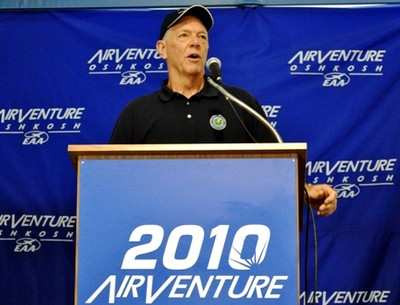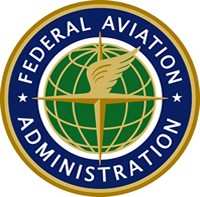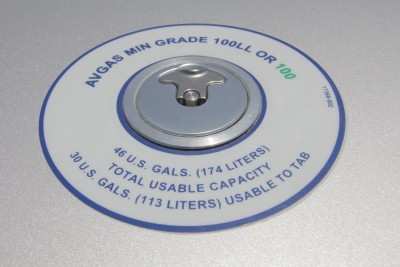Administrator Randy Babbitt Holds AirVenture News
Conference
By Tom Patton
FAA Administrator Randy Babbitt visited the AirVenture Wednesday
for a media briefing on a variety of subjects ranging from his
usual memes of safety and professionalism to the capabilities of
NextGen.

On the subject of GA safety, Administrator Babbitt said the
accident rate is "not where I or the folks at the FAA would like
them to be. We have some very ambitious goals, but the good news is
they are certainly better, the trend is excellent, we're seeing
constant improvement in reducing the number of accidents and the
number of fatalities. But the bottom line is, we set an ambitious
goal and we're not achieving that."
Babbitt said in the first six months of this year, there have
been 120 fatal GA accidents, which is down 8% over last year. He
said last year, amateur-built aircraft accounted for about 25% of
all GA accidents, but they represent only about 10% of the aircraft
in the GA fleet. Babbitt said the FAA would be looking for help
from the EAA and other aviation organizations and pilots themselves
to re-emphasize some of the key safety points he hopes will be
adopted.
Babbitt said a large portion of the burden for safety rests with
those who buy and sell the amateur-built aircraft. "It seems to
always happen after the transition ... the sale of those aircraft.
And so we're really making a big pitch to challenge the buyer of
one of those aircraft to make certain that you get the training
that you need. If you're the seller, make certain that the buyer
understands they are buying a complex airplane. Often these
airplanes are very sophisticated, high wing loading, higher stall
speeds, things like that. All of those mean there is a need for
additional training."
Which led Babbit to his pitch on professionalism. "It pertains
to all aspects of flying," he said. "We can do a lot of things at
the FAA. We can provide a lot of help to people in this business.
but what we can't do is regulate professionalism. I can't make
anybody go that extra mile. But the good news is, in this community
of general aviation, the vast, vast majority of pilots ARE willing
to go the extra mile (emphasis his)."
Babbitt said NextGen will change the way we fly. He said that
the satellite-based system will allow pilots to fly precision
approaches where "we couldn't have any dream, or there's not enough
traffic, in order to justify traditional high-flight-time
navigation facilities. We can't afford to put in an ILS when only 4
or 5 airplanes go there a day. But we can put a satellite approach
in there. We will have the ability to give horizontal and vertical
guidance to virtually any runway in this country. We don't have any
equipment to maintain, we simply have to design the approach. The
equipment will be in the airplane."

The administrator talked about the advantages of ADS-B as well,
which led to the Q&A session. Babbitt said the satellite system
will be more dependable then the traditional system, and that the
number of satellites in the constellation will provide redundancy
to the system. He pointed out that the current navigation and
approach systems are also subject to failure. "I think the more
time we spend, the more comfortable people are that satellite
navigation, because of the sheer number of independent satellites,
offers a great deal of redundancy."
As to the cost of the ADS-B equipment that will be required for
flight in certain airspace in the near future, Babbitt said if the
rate of adoption of ADS-B out is any indication, the adoption of
ADS-B in will come fairly quickly. Babbitt said when he talks to
people in the GA world, and they mention that they have to buy the
new equipment, he responds "Do you think that you'll have the same
transponder in 10 years that we have today? No. So don't buy a new
transponder, buy ADS-B."
At the AeroInnovate event Tuesday evening, an ANN correspondent
heard from many of those presenting ideas that one of the biggest
obstacles to innovation in aviation was the certification process,
and that the cost of certification was their primary reason they
needed capital to get ideas off the ground. Babbitt said that, in
his view, the FAA is a fairly agile agency in some areal of
certification, pointing to the use of ASTM standards and
self-certification in the LSA segment of the industry. "When we get
into more complex areas, I hope people appreciate we're very
deliberative, because people's lives depend on what we certify. And
when we certify something for use all over the country in every
aircraft, we don't have to think is should work, it absolutely has
to work. So, yes, it's a deliberative process, but it is
deliberative on purpose."

In response to a question about lead in fuel, Babbitt said the
EPA is the lead agency on the issue, with the ability and the
statutory authority to mandate unleaded fuel at any time. "We have
asked them 'please don't get ahead of us, let us develop standards
so we will have easily deliverable, safe, efficient fuel that
performs just like 100LL does today, and let us get that in
place'." Babbitt said he was "comfortable" that the industry will
produce an alternative fuel ahead of any EPA mandate for unleaded
avgas.
The number of questions was, unfortunately, limited, as a member
of the local media joined the aviation press at the event, and
asked a series of questions concerning the crash of Jack Roush's
Premier Jet on Tuesday evening. Babbitt tried to explain that the
incident was still only hours old, that the NTSB was the lead
agency in the investigation, and that any possible change in safety
regulations stemming from the incident would be potentially years
away. While we don't in any way advocate the barring of any
legitimate media representative from any event where a public
official is speaking, it would be helpful if they had some inkling
about the aviation industry when they show up at an aviation
event.
 ANN's Daily Aero-Linx (05.06.25)
ANN's Daily Aero-Linx (05.06.25) ANN's Daily Aero-Term (05.06.25): Ultrahigh Frequency (UHF)
ANN's Daily Aero-Term (05.06.25): Ultrahigh Frequency (UHF) ANN FAQ: Q&A 101
ANN FAQ: Q&A 101 Classic Aero-TV: Virtual Reality Painting--PPG Leverages Technology for Training
Classic Aero-TV: Virtual Reality Painting--PPG Leverages Technology for Training Airborne 05.02.25: Joby Crewed Milestone, Diamond Club, Canadian Pilot Insurance
Airborne 05.02.25: Joby Crewed Milestone, Diamond Club, Canadian Pilot Insurance





